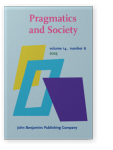Vol. 14:6 (2023) ► pp.883–907
The role of assessments in providing evasive answers in news interviews
This paper examines the role of assessments in the design of interviewees’ answers in news interviews settings on two Arabic networks. It employs a Conversation Analysis approach, in addition to quantitative analysis, to observe the most recurrent positions for emerging assessments in interviewees’ answers. In addition, it examines the role of these assessments in providing evasive answers to interviewers’ questions. The data consists of twenty-eight hours of recorded Arab news interviews from four shows: Liqāʾ Xāṣ (Special Interview) and Bilā Ḥudūd (Without Bounds) on Aljazeera and Nuqṭat Niḏ̣ām (Point of Order) and Muqābalah Xāṣah (Special Interview) on Al-Arabiya. The findings reveal that assessments emerge in recurrent positions in interviewees’ answers and play a role in their design. Likewise, they show the role of assessments in the design of evasive answers.
Article outline
- 1.Introduction
- 2.Assessments
- 3.Assessments in interviewees’ answers
- 4.Data and method
- 5.Results and discussion
- 5.1Assessments in turn-beginnings
- 5.1.1Assessments that address interviewers’ displayed assessments
- 5.1.2Displayed assessments to address the accuracy of questions propositions
- 5.1.3Assessments that introduce new assessables
- 5.2Assessments in interviewees’ turn-endings
- 5.1Assessments in turn-beginnings
- 6.Conclusion
-
References
